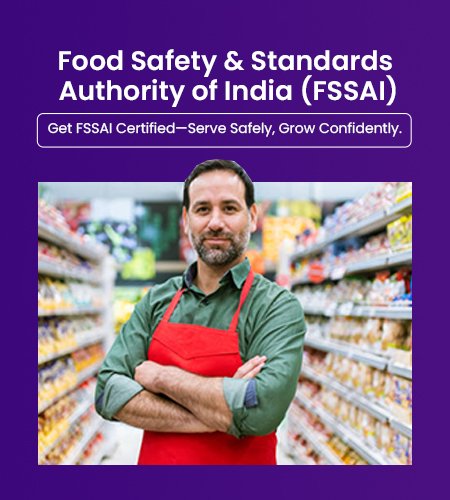
Food Safety and Standards Authority of India
- For small food business operators
- Annual turnover below ₹12 lakhs
- Basic license for petty traders
- Mandatory for homemade food sellers
- Quick and minimal documentation process
- Mandatory for mid to large food businesses
- Turnover above ₹12 lakh annually
- Required for manufacturing, distribution, import/export
- Applicable for state and interstate operations
- Involves moderate to extensive compliance
Food Safety Compliance
Food Safety and Standards Authority of India (FSSAI)
Explore the different types of FSSAI registrations and licenses available
for food businesses in India and their respective requirements.
FSSAI Registration
FSSAI Basic Registration is mandatory for all food-related businesses in India with an annual turnover below ₹12 lakhs, under the Food Safety and Standards Act, 2006. This includes petty food manufacturers, hawkers, small retailers, dhabas, home-based food sellers, and small-scale processors. It is issued by the local FSSAI authority and requires submission of Form A, identity proof, and photos. The FSSAI registration grants a 14-digit FSSAI number, which must be displayed on food packages or premises. This basic form of registration ensures that even small players maintain minimum hygiene standards while operating legally. As the business grows, it must upgrade to a State or Central License based on turnover and operational scale.
Advantages
-
Mandatory Legal ComplianceEnsures lawful food business operation.
-
Low Cost and Simple ProcessQuick application and low government fee.
-
Improves Market CredibilityBoosts consumer trust in home or small setups.
-
FSSAI Logo UsageAllows use of logo to promote safety and hygiene.
-
Online Application FacilityCan be applied easily via FSSAI portal.
-
Encourages HygienePromotes basic safety and sanitation standards.
-
No Professional Help NeededRegistration is DIY-friendly.
Disadvantages
-
Turnover CapOnly valid for businesses with turnover < ₹12 lakhs.
-
Limited ValidityMust be upgraded as the business grows.
-
Limited Operations ScopeNot valid for large-scale distribution.
-
Not Recognized Outside Local JurisdictionApplicable only within local limits.
-
Frequent Renewals NeededTypically granted for 1 to 5 years.
-
No Export ValidityNot accepted for export-oriented units.
-
Limited Enforcement SupportEnforcement varies across regions.
FSSAI State License
The FSSAI State License is required for food businesses with an annual turnover between ₹12 lakhs and ₹20 crores, or for those operating in a single state. This applies to medium-sized manufacturers, storage units, transporters, retailers, marketers, and distributors. The application must be submitted using Form B, along with proof of premises, food safety management plan, and identity documents. The State License is issued by the State FSSAI Authority, and typically granted for 1-5 years. It allows wider operational activities within a state while ensuring compliance with food safety standards. This license is more detailed and regulated than the basic registration, with stricter documentation and inspection norms.
Advantages
-
Enables Business GrowthRequired for expanding medium-scale operations.
-
Improves Legal StandingShows food safety compliance for larger businesses.
-
Applicable to Broad CategoriesIncludes manufacturing, transport, storage, etc.
-
Builds Consumer ConfidenceOffers credibility for outlets and packaging.
-
Eligibility for e-CommerceAllows tie-up with platforms like Zomato, Swiggy.
-
Valid for 1-5 YearsFlexibility to choose license duration.
-
Online Application & TrackingTransparent application process on FSSAI portal.
Disadvantages
-
Applicable Within One StateCannot operate in multiple states.
-
More Stringent NormsDocumentation and inspections are more rigorous.
-
Time-Consuming ProcessApproval may take 30-60 days depending on jurisdiction.
-
Higher Government FeesCostlier than basic registration.
-
Need for Regular AuditsMust maintain records and undergo checks.
-
No Inter-State ValidityLicense not valid outside the registered state.
-
Need for Food Safety OfficersMay require appointment of trained personnel.
FSSAI Central License
The FSSAI Central License is mandatory for large food businesses with an annual turnover exceeding ₹20 crores, or those operating in more than one state, or engaged in import/export of food products. It is issued directly by the FSSAI Central Authority (New Delhi) and applies to large manufacturers, importers, food processing units, airports, ports, and e-commerce platforms. The application requires Form B, detailed plant layout, testing reports, and Food Safety Management System (FSMS) plan. This license also applies to units involved in food exports and is valid for 1-5 years. It ensures national-level compliance, necessary for operating or selling across state or international borders.
Advantages
-
National ValidityAllows operations across multiple states in India.
-
Export & Import EligibilityEssential for international trade in food items.
-
Trusted by Government & InstitutionsNeeded for supplying to large buyers.
-
Professional Brand ImageDemonstrates highest food safety compliance.
-
Regulated by Central FSSAI AuthorityOffers consistent enforcement.
-
Mandatory for Large UnitsNo alternative if turnover exceeds ₹20 crores.
-
Online & Trackable ProcessApplications processed via FSSAI central portal.
Disadvantages
-
Extensive DocumentationRequires detailed plant and safety info.
-
Higher FeesCostlier due to business size and operational reach.
-
Time-Intensive ApprovalMay take longer for processing and inspection.
-
Complex Renewal ProceduresRenewal involves scrutiny similar to initial process.
-
More Frequent InspectionsCentral officers may conduct surprise checks.
-
Strict PenaltiesHeavy fines for non-compliance or misreporting.
-
Need for Technical AdvisorsMay require in-house or third-party consultants.
© ROKADH FINANCIAL SERVICES PRIVATE LIMITED

